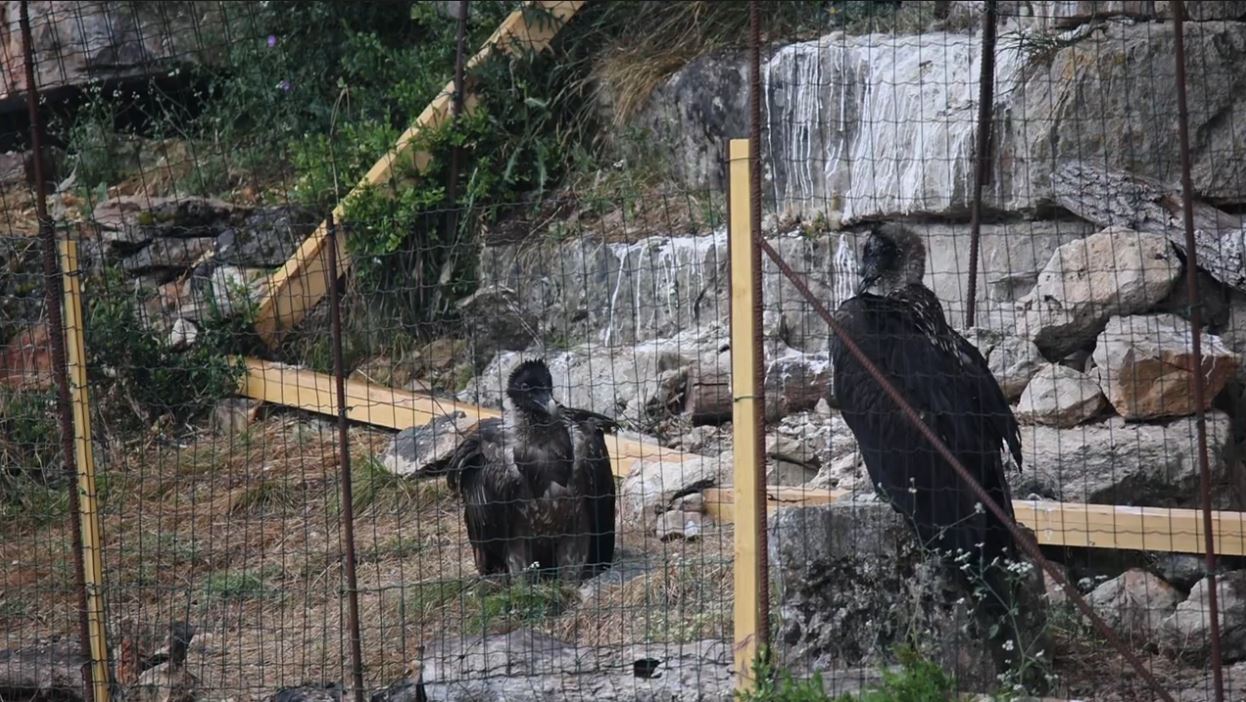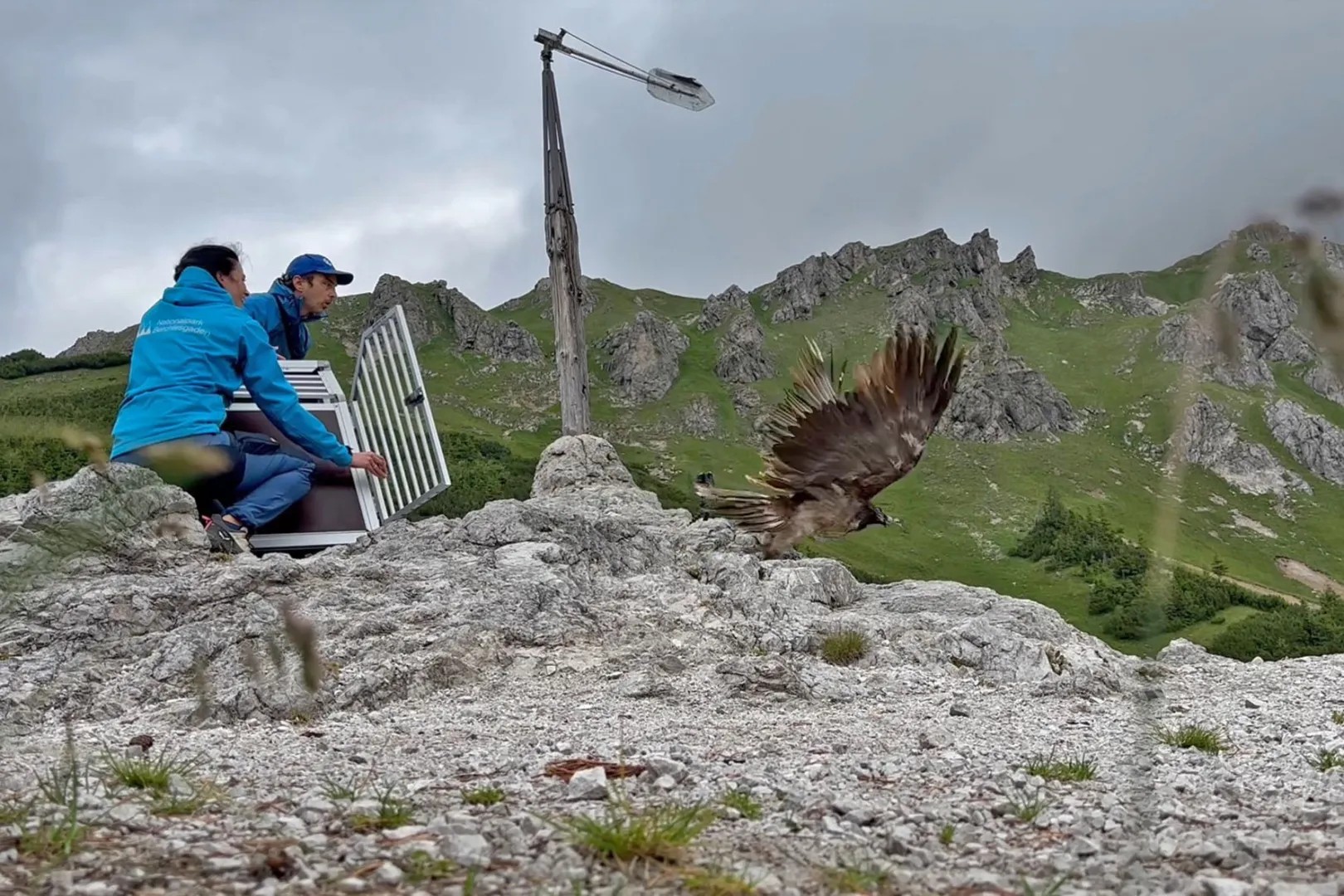
In spring this year, our Bearded Vulture reintroduction project suffered a significant loss – the death of three immature birds. The circumstances of the situation seemed suspicious, with all the signs initially indicating that illegal wildlife poisoning was responsible. In response, our partners at the Junta de Andalucía swiftly launched an investigation, examined all possible causes of death and in the end determined that it all seemed to be the result of an unfortunate natural event – a thunderstorm.
Bearded Vulture behaviour indicates something is wrong
When GPS data showed that a couple of Bearded Vultures were immobile and in the same location at a remote area relatively new to these birds in the Huetor Natural Park in Granada, it raised suspicions. Shortly after, on the morning of 26 April 2021, agents of the Junta de Andalucía went to the scene and sadly found the carcasses of Bearded Vultures Jovan and Vainilla. Climbers then managed to retrieve the third body – it was Trashumancia. All birds were immatures that hatched in 2019. Jovan hatched in the wild while Vainilla and Trashumancia in captivity within the Bearded Vulture Captive Breeding Network, coordinated by us at the Vulture Conservation Foundation (VCF) on behalf of EAZA’s EEP. Their deaths caused a significant blow to our joint reintroduction efforts in the region. Jovan’s parents were captive-bred and released years ago, and he was one of the few Bearded Vultures that recently hatched in Andalusia’s wild. The other two were released last year to boost the species’ local reintroduced population.
Extensive investigation launches to understand what happened
This serious wildlife mortality merited a serious response, and this is what transpired. Thirty agents of the Junta de Andalucía and the Nature Protection Service (Seprona) of the Civil Guard under the coordination of the Antipoison Programme, alongside several working dogs and even a drone and a helicopter, scoured the scene to investigate the incident. Based on the proximity of the Bearded Vulture carcasses and the presence of possible poison baits nearby, as well as other elements, the first inquiries suggested that these three protected birds died of poisoning.
These specialised agents treat every wildlife mortality as a crime until they determine the real cause of death. To do so, they conduct Crime Scene Investigation (CSI), which means examining and documenting the scene, collecting evidence, and submitting the evidence to the laboratory for forensic analysis to help reconstruct the elements of each vase. These processes and procedures are essential to argue the facts of the case in court for a crime and prosecute offenders – something that is rarely done in other parts of Europe and the world for wildlife crime.
Exhaustive necropsy and toxicology analyses don’t find poison
To facilitate the interpretation of the cause of death, the laboratory performed necropsies and toxicological analysis to all possible poison baits (fox carcasses), various relevant samples (soil) and the three Bearded Vultures. In the end, the toxicological analyses that tested 1400 pesticides and 900 other toxicants, including lead and NSAIDs, were negative on all samples. Five external additional laboratories confirmed these results to reinforce the conclusions.
Further examination revealed that the Bearded Vultures’ body conditions and similar contents in the carcass were in good shape, ruling our chronic or debilitating diseases, and concluding that the deaths were sudden. The team did not stop there and continued their exhaustive examinations to get to the bottom of this incident.
Thunderstorm is what likely killed the Bearded Vultures
After a detailed evaluation of the analysis, differential diagnosis, the injuries observed, and the relevant weather conditions, the laboratory concluded that the Bearded Vultures likely died due to trauma caused by a thunderstorm.
On 19 and 21 April 2021, unusual thunderstorms occurred in the area where these Bearded Vultures roamed. These storms caused a pressure shock and powerful electrical discharges causing serious damage to the organs of these animals.
To be precise, the necropsies identified several injuries in the carcasses including, exploded tympanic membrane, cardiac injuries, haemopericardium, kidney lesions and claw contractions. These injuries were inflicted by different aspects of the thunderstorm such as the loud banging noise, a change in pressure and the passage of direct lightning through their organisms. After experiencing these injuries, the vultures fell abruptly, which led to the observed bruises on their skulls.
The fact that they were in an isolated area with no vegetation, far from nearby peaks, at an altitude of 2000 m or higher if they were in flight, possibly favoured the Bearded Vultures acting as a focus for the concentration of the thunderstorm.
Wildlife crime investigation crucial in all cases
The VCF applauds the efforts of the Junta de Andalucía and everyone else involved in this case. The way our partners investigate wildlife mortality is groundbreaking and an example that should be followed elsewhere in Europe and the world. By determining the causes of death, they identify key threats species face and provide roadmaps to mitigate them. If a crime was responsible for mortality, this incredible team can find suspects and achieve convictions, which in turn, helps deter wildlife criminals and achieve justice for wildlife. Andalusia is a world reference in tackling wildlife poisoning and other crimes. The Junta de Andalucía play a key role in the Wildlife Crime Academy we organise within our BaklanDetox LIFE project to help transfer their expertise to competent authorities in the Balkans and beyond to help combat wildlife crime.











